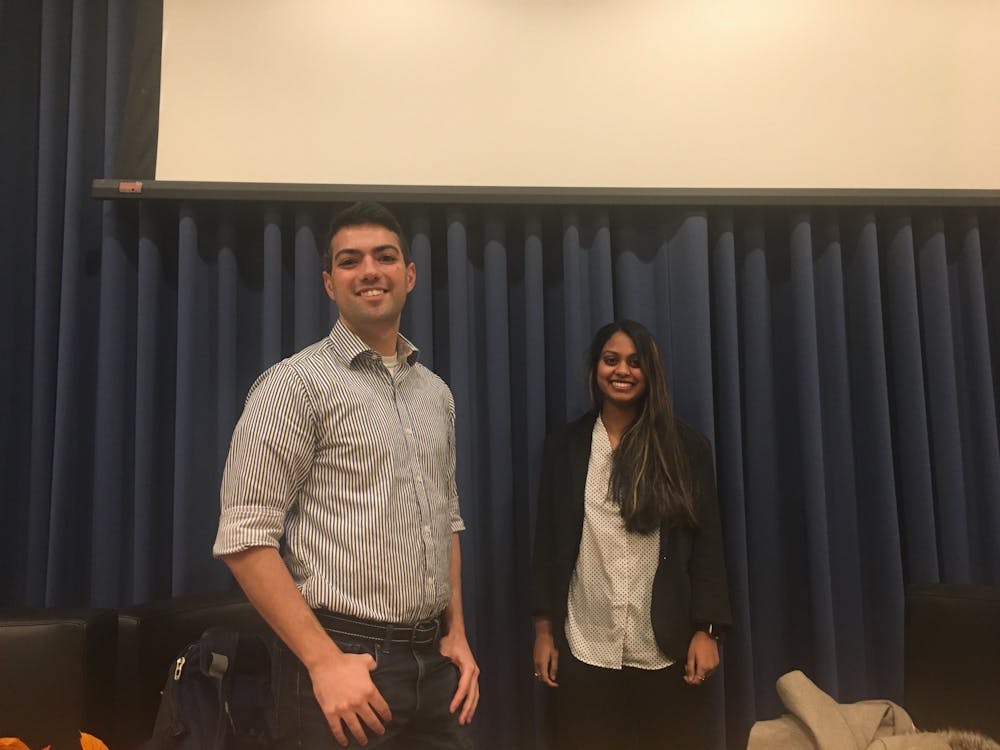In a debate held Thursday night, University Student Government (USG) presidential candidates David Esterlit ’21 and Chitra Parikh ’21 strongly disagreed on the role they each believe USG should play on campus.
Esterlit and Parikh debated before an audience of eleven students at the USG Presidential Candidate Forum on Dec. 5. The presidential candidates presented their campaign platforms and answered questions sent in ahead of time, which pertained to the candidates' visions for the role of USG President and issues of inclusivity, advocacy, cooperation with University administration, and mental health.
There was also a significant conversation on the subject of student apathy, reinforced by the attendance at the event. The 11 students present constituted a slight decrease from last winter’s attendance of 15.
“Look how many people are here,” Esterlit said, gesturing to the empty chairs in front of him. “People have to care.”
Parikh discussed her efforts to reach out to a wide range of students as a way to inspire and provoke meaningful change. She explained that she aimed to seek out students from diverse communities on campus, including those to which she does not belong.
Esterlit stated that he campaigned door-to-door, and found students generally “receptive” to his policy ideas. He described his plan for effective change as the start of a new conversation, and a “fight” against the status quo.
Esterlit pointed out that: “‘Last year, the ‘Prince’ Editorial Board wrote that the USG elections were “without consequence.”’ “The candidates’ positions on the issues were largely the same, and students were cynical and apathetic. I hope that this year I was able to infuse some consequence into the elections.”
One area for conflict between the candidates came through the topic of experience and the candidates’ differing perceptions of the purview of the USG president. Parikh cited her past experience as USG Executive Secretary and Senate Vice President. Esterlit has no current affiliation with USG.
While Parikh demonstrated familiarity with the four USG support committees, and shared her plans for each of them, Esterlit stated that they were “not [his] priority.” When questioned by an audience member, Esterlit admitted that he “[has] not been to a senate meeting” before.
“I found it concerning and a little bit insulting that David is running for president while admitting to knowing very little about the job,” former USG presidential candidate Nate Lambert ’20 noted after the debate. “Not knowing what the chair committees are, like Social Committee and Academics Committee, which I would argue most Princeton students have at least heard about before — and not knowing that it’s his constitutional responsibility to meet with these people each week.”
However, both candidates claimed that they would work over 30 hours per week as USG President; in fact, Esterlit claimed he would dedicate “75 percent” of his time on campus to the position, even at the expense of his academic performance.
When asked about his prior experience, Esterlit cited his three-year tour as a squad commander and light machine gunner with the Israel Defence Forces.

“I learned that no matter how big a challenge might seem, no matter how far you need to run, how much you need to do … you don’t know how strong you can actually be, you don’t know how much you can actually do, unless you try it,” Esterlit said.
Esterlit, a politics concentrator, has based his campaign on the issue of economic reform for low-income students. In his opening statement, Esterlit described an instance of criticism that he received online in response to his campaign, and asserted that such criticisms are a catalyst for the robust change that he believes USG needs.
“He said ... my platform was fundamentally flawed, that I had misjudged the issues and policy descriptions, and that I am disingenuous at best,” Esterlit said. “Obviously I disagree, but at the same time this is exactly what we need. This is just the sort of debate we need on campus. This is just the sort of debate that will get people to care about USG.”
Esterlit went on to explain that he disagrees with the “top-down, sight-unseen” style of financial decisions within the university, instead advocating for a campaign that focuses on “bread-and-butter issues” and a USG that “would no longer stay silent.”
Parikh, an architecture concentrator, used her opening statement to propose a series of priorities for USG that included mental health, Title IX and sexual misconduct, housing, dining and transportation, sustainability, and information accessibility.
“I’m running for president because I think that USG can be a lot more ambitious, and with that a lot more active,” Parikh said. “I personally think it’s super important to be mindful of making sure that we’re bringing all of the voices at this campus to the table.”
Both candidates described what they perceive as the most pressing issue on campus.
Parikh stated that she sees issues of mental health and an accessible campus culture as major priorities, citing the limited number of prescribers available to students. Esterlit said that his biggest priority is delivering Pell Grant money to low-income students.
On the issue of student advocacy groups, the candidates disagreed strongly. While Parikh explained that she would hold meetings with “all activism groups” and “engage with their ideas,” Esterlit stated that he sees USG as “a force for unity” that should not “insert itself” into the affairs of activists.
Similarly, the pair differed on the topic of upper- and under-class inclusivity. Parikh suggested a collaborative calendar of student events and a meal exchange for independent students, while Esterlit doubted the feasibility of any potential efforts to unite older and younger students without entirely removing the eating club system, a move he does not advocate for and believes is infeasible.
One of Esterlit’s main policy ideas is a proposal to “release” the monetary sum of all Pell Grants awarded to University students, given that these grants are currently deducted from students’ financial aid packages.
“These students are big boys and girls and they can decide how to spend that money,” he said. “These platitudes are fantastic, but where is the movement on these issues?”
Esterlit then asked audience members to imagine a policy in the style of Democratic presidential candidate Andrew Yang. He described his leadership style as collaborative, with a “take-no-prisoners approach” and a focus on deliverables.
Candidates also addressed the topic of marijuana legalization in New Jersey.
Parikh said that the University should “follow suit” with any new marijuana policies chosen by the state of New Jersey, and utilize resources like the McCosh Health Center to continue to treat students with health problems.
Esterlit described such a scenario as a “Sophie’s choice between indulging inside or outside of campus,” and called for a “laissez-faire” approach to marijuana policing. He stated that Public Safety should not deal with marijuana-related issues unless a specific complaint has been made.
Finally, both candidates were asked what they would do upon losing the election.
Parikh promised to join the Student Life Committee through USG and continue to fight for mental health initiatives on campus.
“Regardless of outcome, I will continue to engage with these issues because they truly do matter,” Parikh said.
Esterlit claimed that he will join the Princeton Peer Nightline team if he loses the election.
Voting will open at noon on Monday, Dec. 9.








